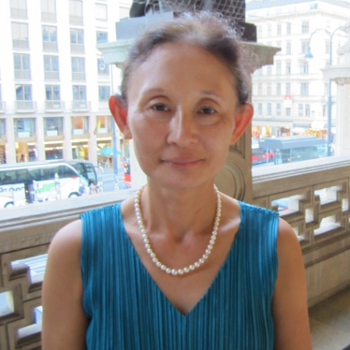As with many opera companies, the Metropolitan Opera is introducing an increasing number of new productions, many of them updated or abstract. Some old productions, however, are retained and revived, often as crowd-pleasers; they faithfully reconstruct the original conception of the opera; for instance Franco Zeffirelli’s Bohème and Sonja Frisell’s 1988 Aida. The first night of Aida on Saturday, after an absence of few years, was more than a routine repertoire performance, however. Revival stage director, Stephen Pickover, emphasized the inner motivations and conflicts of each character and made Aida not only an occasion to show off the grand sets by Gianni Quaranta, with Egyptian court scenes and victory processions filled with royalties, priests and soldiers, as well as horses, but also a touching human drama of love and betrayal. Aided by solid leadership by conductor Marco Armiliato, conducting from memory, the performance was full of nuanced singing and acting, and was an occasion to savor Verdi’s genius as he developed complex harmonic language on top of beautiful melodies, the process that culminated in his final two operas, Otello and Falstaff.
Singing the role of the Egyptian warrior Radamès, Marco Berti got off to a rocky start in the tenor’s punishing opening aria “Celeste Aida”, sounding somewhat flat and short of legato despite his big and strong voice. His performance improved steadily throughout the afternoon, however, and his soft singing in the final tomb scene was heartwrenching. He had the requisite volume and ringing high notes elsewhere, and was clearly heard in the ensemble scenes.
Liudmyla Monastyrska is a veteran of this production, and she showed an excellent command of her formidable voice as Aida. It is a big beautiful voice that is produced with seeming ease, and can scale the range of the role with remarkable continuity. Her high notes often trailed into delicate pianissimo before opening up. I was most impressed with her strong chest voice that remained full and thrilling as she sang Aida’s lower notes. Aida’s two big arias, “Ritorna vincitor!” and “O patria mia” were exciting and exquisite; the latter was the highlight of the afternoon.
The third principal role, Egyptian princess Amneris, was sung by Ekaterina Gubanova, making her role debut here. She was a strikingly beautiful figure on stage, and sang with more elegance and nuance than what one would expect of Amneris, typically full of jealousy and fury. While her voice was smaller than her colleagues', her high notes had a great range and extension, soaring above the orchestra when needed. One would have wanted a stronger chest voice, but in the crucial judgement scene, she delivered a stunning portrayal of a desperate and angry princess with her crystalline top notes and committed acting.
Mark Delavan’s baritonal voice suited the demands of Amonasro, Aida’s father, and he sang with impressive vigor, as well as subtlety. He was a natural actor on stage, showing the dignity of a king in exile as well as compassion for his daughter. Singing the King, Solomon Howard impressed with his rich and resonant voice and one longed to hear him in a larger role. Dmitry Belosselskiy's Ramfis was utterly commanding as he led the chorus in their "guerra!" battle cries.
The reason for the success of the opening matinee of this warhorse is what makes the opera so appealing: great music and story, grand but appropriate stage sets, musicians and singers with true professional commitment doing what they do best, making a moving human drama with their artistry.




